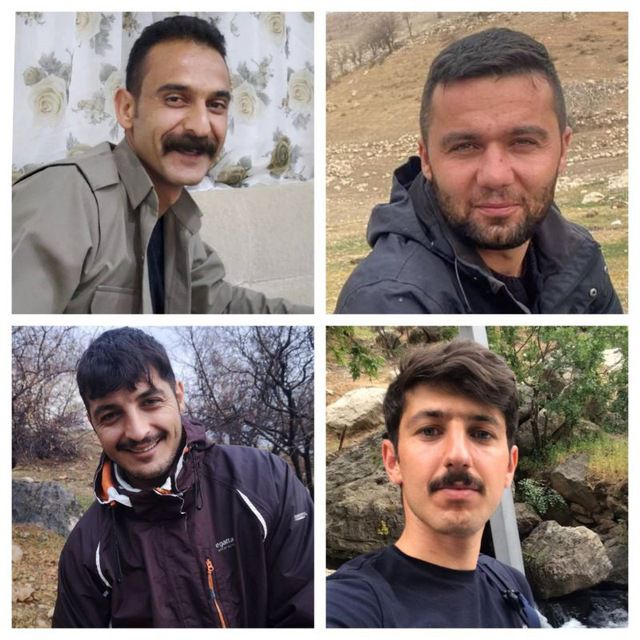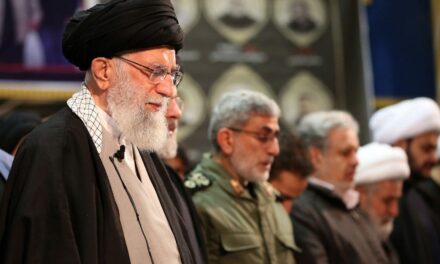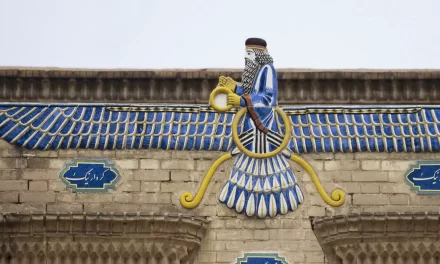Photo: Four Kurdish opposition political activists detained by Iran
“The effects of physical and psychological torture were clearly visible on my husband and his other companions during the videotaped forced confessions that the Iranian regime broadcast to them,” Joana Timsi, the wife of political activist Mohsen Mazloum, who is imprisoned in Iran, told News East.
Last July, the Iranian regime’s “Iranian Intelligence” intelligence arrested Mohsen Mazloum and his three other companions, Muhammad Faramarzi, Pizhman Fathi and Wafaa Azarbar, all of whom are political activists and members of the anti-Iranian Kurdistan Komala Party in Urmia province, Iranian Kurdistan, while they were carrying out organizational activities.
And Iranian intelligence announced in a statement on July 23 that it had arrested 4 members of the Komala, charging them with espionage for the Israeli Mossad and planning to bomb an air base in Isfahan.
Joana Timsi said, “The Iranian regime has ready charges that it fabricates whenever it wants against political activists and opponents, including espionage for Israel, America and the West. My husband and his comrades were accused of espionage for Israel, and the charge of planning to carry out bombing operations at a time when the regime arrested them were not armed because they were carrying out tasks.” political organization, as opposition activists in eastern Kurdistan, “Iranian Kurdistan”, and not as the Iranian regime claimed that it arrested them in Isfahan.
The fate of the four activists remained unknown for more than 80 days after their arrest, until last October the Iranian regime broadcast a videotape of their forced confessions and their implementation of tasks they never carried out, according to their families and those close to them.
Timsi added, “They were forced to make these confessions under torture. They said that they were collaborators with the Israeli Mossad, that they were arrested in Isfahan, and that they traveled to African countries such as Tanzania and Rwanda, while these four did not leave outside Iraqi Kurdistan, and I do not expect that they even heard the names of these countries.”
The Iranian regime re-published the confessions at the beginning of this December, which raised the fears of the families of the arrested activists for their children and those sentenced to death by the regime, coinciding with the campaign of executions launched by the Iranian Wali al-Faqih regime against demonstrators and activists opposing it.
Despite attempts by the activists’ families and their lawyer clients during the past five months to find out information about the whereabouts of the four activists and their health conditions, the regime prevents access to them.
Timsi explained, “The team of lawyers visited most of the cities of Kurdistan and other Iran to obtain information about their places of detention, but to no avail. The lawyers were insulted by the regime’s security services, and the four detainees are still prevented from meeting their families or even contacting them.”
For her part, Bayan Azimi, the wife of the detained activist Pizhman Fathi, confirmed all the information Timsi mentioned about the detained activists, and added to “News East”, “My husband and his companions are in the prisons of the Iranian regime and are suffering under both physical and psychological torture, and the regime seeks to end them in secret. As it is well known, the Iranian regime seeks, through false news, documented films, and ready-made charges, to accuse activists and opponents of espionage in order to cover up its crimes.
Azimi lives with her daughter in Germany in difficult humanitarian conditions, while her husband is in Iranian prisons, and Azimi pointed out, “My child calls for her father every day, and she is sick and needs her father. We call on the free people in Iran, the world, the international community, andhumanitarian organizations to extend a helping hand to these detainees and save them from the oppression of the regime.” and return them to their families safely.”
In the same context, the Hana Organization for Human Rights in Iran revealed that “during the nearly five months that have passed since their arrest, the prisoners’ families made every effort to find out their conditions, but they did not receive any information about the whereabouts of the detainees, not even their conditions.”
The statistics of the human rights organization indicate that more than 5,000 people have been arrested by the Iranian security services in the cities of Iranian Kurdistan since the outbreak of popular protests in Iranian cities in mid-September, while more than 469 people were killed, including 133 Kurds during the ongoing protests, which calls for the end of the Iranian regime of the Guardian Jurist.





